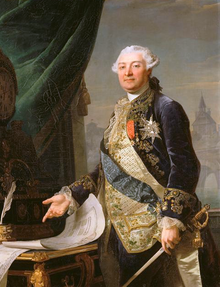Louis Auguste Le Tonnelier de Breteuil

Louis Charles Auguste le Tonnelier, Baron de Breteuil (born March 7, 1730 in Azay-le-Ferron , today's Indre department , † November 2, 1807 in Paris ) was a French diplomat.
Live and act
Breteuil was only twenty-eight when he was in 1758 by Louis XV. was appointed envoy to the Elector of Cologne; two years later he was sent to Saint Petersburg as ambassador to the Russian court . He arranged that he would be temporarily absent from his post during the Palace Revolution that brought Catherine II to the throne. In 1769 he was transferred as envoy to the Swedish court in Stockholm, and then he represented the French king at the imperial court in Vienna, the royal court in Naples and Vienna again until 1783 when he was recalled to become minister of the royal household. In this function he carried out extensive reforms in the prison administration. As a close friend of Marie Antoinette , he immediately came into conflict with Calonne , who in 1787 demanded his release. His influence on the king, and especially the queen, remained unshaken.
When Necker's dismissal on July 11, 1789, Breteuil succeeded him as chief minister. The fall of the Bastille three days later put an end to the new cabinet, and Breteuil went to Switzerland with the first emigrants. In Solothurn in November 1790 he received from Ludwig XVI. having exclusive power to negotiate with the European courts, and in his efforts to control the imprudent diplomacy of the emigrated princes, he soon came into conflict with his old rival, Calonne, who was one of their chief advisors. In 1791 he had a footpath built through the Verena Gorge near Solothurn to diversify the emigrants .
After the failure of the flight to Varennes, in whose planning he had been involved, Breteuil received from Louis XVI. Instructions intended to restore friendly relations with the princes. His distrust of the king's brothers and his defense of Louis XVI's prerogative. were to some extent justified, but his unyielding attitude towards the princes accentuated the disunity of the royal family in the eyes of foreign rulers. They saw in the Comte de Provence the natural representative of his brother and found in the contradicting statements of the negotiators an excuse for their non-interference in favor of Louis. Breteuil itself has been the target of violent attacks by the Princes' Party, which claimed that it was insisting on exercising powers granted by Louis XVI. had been canceled. After Marie Antoinette's execution , he withdrew into private life near Hamburg and did not return to France until 1802.
In 1785 he became an honorary member of the Académie des Sciences .
Web links
- Correspondence between Louis Auguste Le Tonnelier de Breteuil and Carl von Linné
Individual evidence
- ^ André Schluchter : Breteuil, Louis Auguste Le Tonnelier de. In: Historical Lexicon of Switzerland .
- ^ List of members since 1666: Letter B. Académie des sciences, accessed on September 27, 2019 (French).
| predecessor | Office | successor |
|---|---|---|
| Paul-François de Galluccio de L'Hôpital |
French Ambassador in Russia 1760 - 1763 |
Nicolas-Mathieu de Bausset-Roquefort |
| Jean-Baptiste-François Rossignol |
French ambassador in Sweden 1763 - 1767 |
Abbé Duprat , Gt |
| Aimeric Joseph de Durfort-Civrac Abbé Georgel |
French Ambassador to Austria 1770 - 1770 1774 - 1783 |
Durand d'Aubigny Emmanuel Marie Louis de Noailles |
| Jacques Necker |
President of the Royal Finance Council July 13, 1789 - July 16, 1789 |
Jacques Necker |
| Philippe-Henri de Ségur |
French Minister of War August 29, 1787 - September 23, 1787 |
Athanase-Louis-Marie de Loménie |
| personal data | |
|---|---|
| SURNAME | Breteuil, Louis Auguste Le Tonnelier de |
| ALTERNATIVE NAMES | Breteuil, Louis Charles Auguste le Tonnelier Baron de; Le Tonnelier de Breteuil, Louis Auguste |
| BRIEF DESCRIPTION | French diplomat |
| DATE OF BIRTH | March 7, 1730 |
| PLACE OF BIRTH | Azay-le-Ferron , Indre department |
| DATE OF DEATH | November 2, 1807 |
| Place of death | Paris |